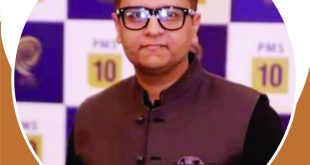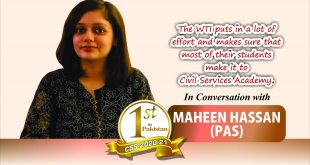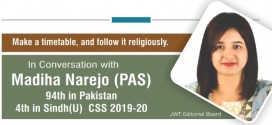World Times is the finest institute in Lahore for the preparation of CSS exam. I prepared for both written and interview parts of CSS from WTI.
Jahangir’s World Times (JWT): First of all, please tell us about your educational background?
Muhammad Shahab Aslam (MSA): I did FSc from Government College University (GCU), Faisalabad, and later MBBS from Independent Medical College from the same city.
JWT: Since everyone starts dreaming of a future career right from the childhood, what were your dreams? Did you always aspire to be a CSP officer?
MSA: Not always. I wanted to be a doctor and I did achieve my aim. But, later on, I realized my real interest was in administration because it gives you a broader canvass to draw your services for the citizens of this country.
JWT: What feature of Pakistan Administrative Service (PAS) attracted you most?
MSA: Pakistan Administrative Service is the occupational group that brings you closest to the public; where you can come in direct contact with the citizenry, know their problems and try to solve those to the best of your abilities.
JWT: How was your experience at the World Times Institute?
MSA: In my opinion, World Times is the finest institute in Lahore for the preparation of CSS exam. I prepared for both written and interview parts of CSS from WTI and during the process, I learned a lot from my respected teachers. However, it must be remembered that academies or institutes give you the basic framework; you need to build on it with your personal will and hard work.
JWT: What, in your opinion, is the key to making a difference in written part of CSS exam?
MSA: The single most important factor in making a difference is the “originality of your content”.
 JWT: What were the toughest and the easiest parts in the whole process of CSS exam?
JWT: What were the toughest and the easiest parts in the whole process of CSS exam?
MSA: Naturally, English Essay takes up a lot of time, and rightly so, because it is the most difficult paper. For English Essay, take a two-pronged approach: improve your language skills and simultaneously work on current affairs. Practice essays by picking up a topic, studying it thoroughly and then trying to write it from different perspectives.
JWT: Anything important about your CSS journey you want to share with the aspirants?
MSA: On the basis of my experience, I believe CSS aspirants face two major obstacles in this long and arduous journey. They are confusion and frustration. Try to stay clear-minded by scanning through previous papers and seeking advice from seniors. For frustration, you have to go in fearless. And, don’t lose heart! See the journey of CSS is something that is making you knowledgeable and a better person with every passing day.
JWT: How answers should be written to secure excellent marks?
MSA: Most importantly, the content should be original. And, the answers should also be relevant, concise and coherent. Do not unnecessarily complicate the answers. Where applicable, justify your arguments with historical precedents and international law. Draw maps, diagrams and flowcharts to give the examiner a good idea about where you are headed with the answer.
JWT: Should there be some word limit kept in mind while writing answers?
MSA: There is no fixed word limit. All your answers should be concise, relevant and, of course, to the point.
JWT: How did you structure your Essay?
MSA: My general rule for essay and all the questions of CSS papers was to divide each answer into three parts: introduction, body and conclusion. This simple template keeps your answers neat and relevant. Make a rough outline of your essay, or answer, for that matter, in the beginning and start writing on it. Finalize the outline when you have completed your essay. This gives you manoeuvrability because when you start writing, you deviate, subtract and add in your original ideas.
My Tips on
Selection of optional subjects
1. Pick a subject in which you have expertise.
2. Pick a subject and get a basic idea of it to know if it sits well with you.
3. Try to make families of subjects so that they may complement each other, for example you can opt for international relations with international law.
4. Also consider the scoring trend – it does matter.
Notes-making
I used to select one book as the standard book and then I would make notes on it of the things that I find important from other sources like the internet. In the end, you have limited time for revision, so you should keep your data concise and placed in a single place.
Revision
During your initial preparation, try to ingest the concepts, and note down important points of everything so that you may have enough time to revise important points in the end.
My Advice for Fresh Aspirants
When you start your CSS journey, go in without fear. Avoid rote learning, try to understand the concepts, improve your language skills and come up with original answers.
My Interview Experience
A major part of my interview was based on my optional subjects. Some questions from current affairs were also asked. The first question the panellists asked was on the disadvantages of NGOs. I was able to answer it pretty well. I mentioned how NGOs are used as espionage tools and how they, sometimes, hinder the growth of government agencies whose functions these very NGOs are supposed to be supplementing. Respected chairman seemed very happy with my answer.
To simply state, interview is not just the test of your knowledge; it assesses your whole personality. You should stay very calm and composed. It does not matter if you cannot answer all the questions, nobody knows everything. What is more important is how you carry yourself when you know the answer, and more importantly when you don’t.
 Jahangir's World Times First Comprehensive Magazine for students/teachers of competitive exams and general readers as well.
Jahangir's World Times First Comprehensive Magazine for students/teachers of competitive exams and general readers as well.




